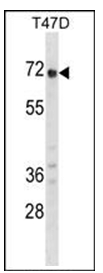Glypican 2 (GPC2) (N-term) Rabbit Polyclonal Antibody
Other products for "GPC2"
Specifications
| Product Data | |
| Applications | WB |
| Recommended Dilution | ELISA: 1/1,000. Western blotting: 1/100-1/500. |
| Reactivities | Human, Mouse |
| Host | Rabbit |
| Isotype | Ig |
| Clonality | Polyclonal |
| Immunogen | KLH conjugated synthetic peptide between 136-165 amino acids from the N-terminal region of Human GPC2 (NP_689955.1) |
| Specificity | Recognizes GPC2 (N-term). |
| Formulation | PBS with 0.09% (W/V) Sodium Azide as preservative State: Aff - Purified State: Liquid purified Ig fraction |
| Concentration | lot specific |
| Purification | Protein A column followed by peptide Affinity purification |
| Storage | Store the antibody undiluted at 2-8°C for one month or (in aliquots) at -20°C for longer. Avoid repeated freezing and thawing. |
| Stability | Shelf life: one year from despatch. |
| Gene Name | Homo sapiens glypican 2 (GPC2) |
| Database Link | |
| Background | The glypicans (GPC) constitute a family of heparan sulfate proteoglycans that are attached to the cell surface by a lycosylphosphatidylinositol (GPI) anchor. Six members of this family have been identified in mammals (GPC1-GPC6). All glypican core proteins contain an N-terminal signal peptide, a large globular cysteine rich domain (CRD) with 14 invariant cysteine residues, a stalklike region containing the heparan sulfate attachment sites, and a C-terminal GPI attachment site. Based on the degree of their amino acid sequence similarity, two subfamilies of glypicans have been defined. One subfamily (sharing from 35-63% sequence homology) includes GPC1, 2, 4, and 6, while the second subfamily (sharing 54% sequence identity) includes GPC3 and 5. Proteins between the two subfamilies also share 17-25% sequence similarity (1-4). Glypicans are widely expressed in adult and fetal tissues. During embryonic development, the expression level of the various glypicans changes in a stage and tissue specific manner. GPC2, also known as cerebroglycan, is primarily expressed in developing neuronal tissues including the brain, spinal cord, dorsal root ganglia, and cranial nerves. It is found on the tracts of actively growing axons (5). Cell surface GPC2 binds midkine, indicating midkine GPC2 interaction may participate in neuronal cell migration and neurite outgrowth (6). |
| Synonyms | GPC2 |
| Note | Molecular Weight: 62830 Da |
| Reference Data | |
| Protein Families | Druggable Genome |
Documents
| Product Manuals |
| FAQs |
{0} Product Review(s)
0 Product Review(s)
Submit review
Be the first one to submit a review
Product Citations
*Delivery time may vary from web posted schedule. Occasional delays may occur due to unforeseen
complexities in the preparation of your product. International customers may expect an additional 1-2 weeks
in shipping.






























































































































































































































































 Germany
Germany
 Japan
Japan
 United Kingdom
United Kingdom
 China
China




